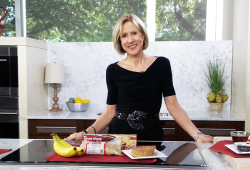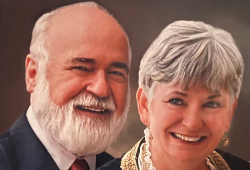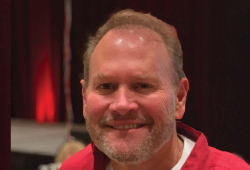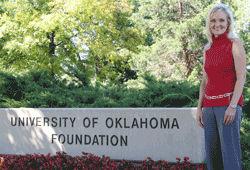Supporters Like You

Neva Cochran
“Several years ago, I heard a longtime dietitian leader and past Chair of the Academy of Nutrition and Dietetics Foundation say, ‘Give until it feels good’ and ‘Give until you feel proud. Sometimes people believe if they can’t give ‘big’ then they shouldn’t give at all. Nothing could be further from the truth.”
Read more of her story
If there’s one thing OU alumna Neva Cochran wants the world to know, it’s that proper nutrition is about eating beyond the headlines.
Cochran is an award-winning registered dietitian nutritionist (RDN) who works as a nutrition communications consultant in Dallas, Texas. In a world of fad diets and misleading internet articles, healthy eating can seem more confusing than ever. Cochran works to demystify nutrition by focusing on the facts of nutrition research, and her $1 million bequest to the OU College of Allied Health’s Nutritional Science program paves the way for other RDNs to do the same.
Cochran’s mother grew up in the fourth generation of a farming/ranching family. While Cochran grew up cooking meals with her and taking four years of home economics in high school, she originally majored in math. But after taking a philosophy class called Elementary Logic, she realized that it wasn’t necessarily math that she loved — it was the logical problem-solving process used in both math and science.
“I discovered one of my sorority sisters was majoring in nutrition,” Cochran said. “I looked into it and learned it required a lot of science courses like physiology, chemistry and microbiology, but it related to something that is important for everybody: food and nutrition for good health.”
After graduating from OU with a degree in dietetics and nutrition, completing her dietetic internship, working in a hospital setting and teaching nutrition to dietetics and nursing students, she found her niche when she accepted a position at a local Dairy Council in the Dallas area. She soon realized that nutrition education was her passion, sparking a career of nutrition consulting and media appearances.
Cochran’s passion for nutrition education spurred her to establish the Mary Green Lovelace Scholarship, to which half of her $1 million bequest is going. The scholarship assists students in OU’s Department of Nutritional Science who aim to become registered dietitian nutritionists.
“My aunt, Mary Green Lovelace, died in 2016 at 95 years old,” Cochran said. “To honor her, my family’s five-generation farming and ranching legacy and the valuable role that farmers play in providing an abundant, safe and nutritious food supply, I named the scholarship after her.”
Each scholarship applicant must demonstrate their ability to communicate nutritional facts through a written essay, with a focus on the role of modern agriculture in providing a safe and nutrient-rich food supply. Cochran stays in touch with her scholarship recipients, and she has even precepted some of them as interns.
Cochran is also creating a research endowment for OU’s Nutritional Science Department. When it comes to healthy eating, it’s important to listen to the research-proven facts, and a research endowment can pave the way for new nutrition breakthroughs.
“The 2017 Global Burden of Disease Study of dietary consumption patterns in 195 countries, funded by the Gates Foundation, found that poor diet was responsible for 11 million deaths, with heart disease the leading cause, followed by cancer and diabetes,” Cochran said. “Nutrition and diet are essential components in the prevention of and treatment of these diseases. More registered dietitian nutritionists are needed to help patients, clients and consumers in a variety of settings to understand and implement dietary habits that will promote health.”
Neva encourages readers to give, even if the gifts are small. “Several years ago I heard a longtime dietitian leader and past Chair of the Academy of Nutrition and Dietetics Foundation say, ‘Give until it feels good’ and ‘Give until you feel proud,'” Neva said. “Sometimes people believe if they can’t give ‘big’ then they shouldn’t give at all. Nothing could be further from the truth.”
Robert and Diana Capehart
“The OU College of Medicine did not have a professorship or program directly pointed toward medical/ethical problems, and with the medical school being a training center, I feel that this professorship will stimulate research on the ethics of human research, clinical practice, public health, and medical innovation, in addition to exposing students to these issues early in their training.”
Read more of their story
In his 50-plus years of practicing medicine, Robert Capehart, M.D. made many decisions about patient care. Some were simple, like black or white, others more difficult and mired deeper in gray areas. Those gray area questions would often lead him to examine his beliefs, his options and his obligations.
During his long career, Capehart was passionate about educating young physicians and medical students not only in clinical medicine but also in medical ethics and humanities. Now retired, he has had time to reflect on his career and how he approached situations and decisions, comparing and contrasting them to the environment, attitudes and morals that new doctors face today. The result of his introspection is the creation of a $2 million endowed professorship for medical ethics at the OU College of Medicine.
“In today’s climate, there are many medical issues and ethical issues that those in the medical field are encountering – be that as a physician, nurse or other provider,” Capehart said. “The OU College of Medicine did not have a professorship or program directly pointed toward medical/ethical problems, and with the medical school being a training center, I feel that this professorship will stimulate research on the ethics of human research, clinical practice, public health, and medical innovation, in addition to exposing students to these issues early in their training.”
Physicians are required to make challenging judgment calls and hold themselves to high medical ethics standards, which minimizes errors and fosters trust, accountability, and respect between physicians and their patients, Capehart said.
“While making these challenging judgement calls, the physician must act within several strictures,” he said. “Number one: the legal stricture, the law, may dictate one way or another. They must decide what is acceptable and appropriate care from a medical viewpoint, and then what is acceptable from the patient’s viewpoint.
“You also have strictures within the hospital. The hospital may, in some cases, dictate what can happen in a medical situation. Finally, you have insurance companies, third-party carriers who may say ‘no, we won’t do this or that’ and they work to make a decision go another way because of money,” he added.
“All these things don’t always flow in the same direction. Those parties are often obtuse to each other. Still, any decision has to be in the strictures of what is legal. Then the decision comes back to the physician. … What does he/she do?” One of Capehart’s main goals in establishing the professorship is to simply call attention to an area that he felt was not being adequately addressed. “You need to have a very open discussion in order to come to a conclusion that is correct in a legal fashion, and in a medical fashion and in an ethical fashion,” he said. “It’s a tough area to be in because there are so many conflicting forces that are pulling in different ways.”
He also wants to take ethics discussions into the public arena. “I read a story about a physician in another state who said that if his patients did not take the vaccine recommended by the government, he would not see them as a patient any longer,” Capehart said. “Is that ethical? I don’t have an answer and you don’t have an answer, but it’s something we ought to have an answer to, and the only way you’re going to arrive at it is to have a discussion. There just needs to be more discussion and more involvement.”
The Capehart Endowed Chair for Medical Ethics will be established as part of the planned legacy of Capehart and his wife, Diana, a former surgical nurse. They live in Tulsa.
Capehart is a 1965 graduate of the OU College of Medicine. During his internship at St. John’s Medical Center in Tulsa, he decided to focus on colorectal surgeries. He was instrumental in building Tulsa Medical College, which became the OU-TU School of Community Medicine. He served as the first chair of the Department of Family and Community Medicine and the first program director for the family practice residency.


Greg Kubiak
“I hope that anyone who wants to have a wonderful OU experience can through these scholarships.”
Read more of his story
Greg Kubiak worked for some of America’s most influential people and institutions, but none shaped his life more than those he encountered as a University of Oklahoma student. That influence is now reflected in a planned gift to the OU Foundation.
“I’d always hoped to be able to leave something to the OU programs that meant the most to me,” said Kubiak, a former U.S. Senate legislative director, author and chief public affairs officer for the Southeastern Universities Research Administration.
The 1983 alumnus pledged $2 million to be divided equally between OU President’s Leadership Class scholarship funds named for the late, legendary university administrators David A. Burr and Anona Adair and the OU LGBTQ Alumni Society, which Kubiak helped establish.
“I hope that anyone who wants to have a wonderful OU experience can through these scholarships,” he said, adding that the OU President’s Associates also will receive support from ongoing mineral royalties.
A native of Spencer, Okla., Kubiak remembers the moment his life changed. The shy freshman had been recruited to the PLC-one of OU’s most prestigious student organizations -and was listening to a presentation by its founder, David A. Burr.
“David said, ‘If any of you want to visit more in between classes, stop by,’ ” Kubiak said. “Well, I took him up on that, and it was the beginning of a great mentorship and friendship.”
He became a student assistant to Burr, then vice president of University Affairs, former dean of students and an intricate part of the OU fabric. “David Burr was one of the most impactful mentors of my life,” Kubiak said.
The political science major also joined student government and was elected president of the OU Student Association, or UOSA, his senior year. “That was an amazing, wonderful experience, as well,” Kubiak said. Through UOSA, he worked closely with Anona Adair, associate vice president of OU Student Affairs and later the university’s first woman vice president.
“We developed a great friendship and stayed friends all the way to the end of her life,” he said.
Kubiak went to work at the U.S. Capitol soon after graduating and rose to chief legislative director, addressing such issues as campaign finance reform. His knowledge became the book, The Gilded Dome: The U.S. Senate and Congressional Finance Reform, published by the OU Press.
Kubiak maintained close ties to OU, traveling to football games and PLC reunions. “I know how impactful the PLC was for me, not only in introducing me to leaders and examples of leadership, but in meeting students who are my friends to this day,” he said.
Out of such OU connections came the LGBTQ Alumni Society, which Kubiak helped develop in 2013 with alumnus and fellow former UOSA president Joseph Sangirardi.
The alumni society established a fund in 2016 to support scholarships for LGBTQ students, and hundreds of donors stepped forward with more than $100,000 in gifts. The society has awarded $30,000 in scholarships during the past six years.
“I hope that the recipients can continue to grow and thrive and be advocates for positive change in their lives and society,” Kubiak said.
He recalled that OU faced-and lost-a protracted legal battle against the Gay Activist Alliance when the student organization was refused UOSA funding. Coincidentally, an appropriation was finally approved by the OU administration during Kubiak’s 1983 tenure as UOSA president.
“It’s been quite a trajectory for OU,” he said, “and I’m glad to have played a part in it.”
Rita Sherwin
“Scholarship money is needed now more than ever. It feels good to me that I am doing this. Anybody can make a planned gift and in any amount. There’s no giving amount that’s required.”
Read more of her story
Rita Sherwin was curious about how she could give to the University of Oklahoma. Then, one day, she overheard a conversation about estate gifts by her colleague, Gary Beadles, vice president and general counsel at the OU Foundation.
A 28-year employee of the OU Foundation, Rita said planned giving was relatively new to her. “I thought, ‘Wow, that’s pretty cool.’ So I started quizzing Gary and asking him questions. I thought it was a really great idea. I did not have to give up front; in fact, it’s a really painless way of giving to the University.”
Rita wanted to make a charitable contribution to OU, but needed to do so in a way that would fit her own personal and financial needs. After discussing the idea with her daughter, Rita worked with OU’s planned giving staff and included OU in her estate with a gift to establish an endowed scholarship for students who are single parents or are children of single parents.
“I was a single parent and my daughter got scholarships, and it was a godsend to receive that money,” said Rita, whose daughter graduated from OU in 2005 with a bachelor’s degree in psychology. “I just thought that was a way I could pay back — or pay it forward, so to speak. I could establish a scholarship for single parents or children of single parents, too, and I wouldn’t have to pay this very second.”
Rita has already started giving to the fund, making a $1,000 cash gift in the spring. The OU Foundation matches employee gifts, so Rita is able to double the impact of her gift. She hopes to endow the fund before the planned gift is realized, and said her estate gift will only enhance the scholarship fund.
“Scholarship money is needed now more than ever. It feels good to me that I am doing this,” she said. “Anybody can make a planned gift and in any amount. There’s no giving amount that’s required.”
By making an estate gift, Rita is a member of the George Lynn Cross Society. Rita said she knows she will leave a lasting legacy of support for generations of OU students. After a brief pause, Rita reflected on the scholarship and its future impact, saying, “It feels good to give a gift that will last forever.”

